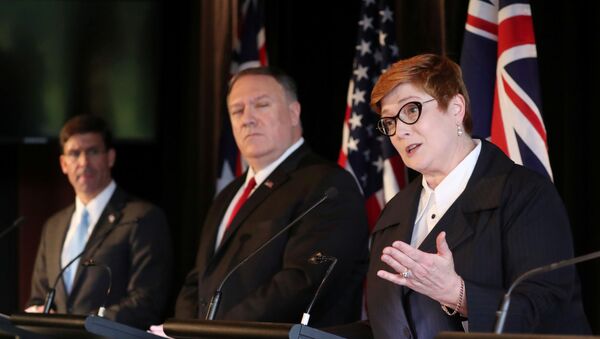Australia's Defence Minister Linda Reynolds has ruled out the possibility that her country would provide a base for US mid-range missiles.
Speaking to Australian Broadcasting Corp. radio in the wake of talks with US officials in Sydney over the weekend, Reynolds stressed that US Defense Secretary Mark Esper "made no request, and that he wasn't anticipating any request" for Australia to be the base for any such missiles.
"I asked him directly, 'Was there any expectation of a request,' and he said, 'No,'" Reynolds added.
Australia's Defence Minister said while the locations for the missile bases were not yet known, Australia would not be one of them.
On Monday, Prime Minister Scott Morrison also confirmed that Australia would not be deploying US missiles.
"It's not been asked of us, not being considered, not been put to us. I think I can rule a line under that," the Prime Minister told reporters in Brisbane.
Earlier, as he set out on a week-long tour to the Asia-Pacific region, the US Defense Secretary said he wanted to deploy intermediate-range conventional missiles at various Asia-Pacific sites within months, in a move that is likely to provoke an angry response from China.
"We would like to deploy a capability sooner rather than later," Esper, who assumed the top job at the Pentagon last month, told reporters on a plane to Sydney at the start of his tour.
"I would prefer months ... But these things tend to take longer than you expect."
He didn't specify the destination of the weapons, noting that Washington usually discusses such issues with its allies.
Australia-United States Ministerial Consultations, or AUSMIN talks, have served as a forum for the allies’ joint strategic, foreign and defence policies for 34 years.
Australia is potentially vulnerable to deteriorating ties between its most important strategic ally, the US, and China - its biggest trading partner.
INF Treaty Collapse
Washington officially withdrew from the Intermediate-range Nuclear Forces (INF) Treaty on 2 August after suspending it in February, claiming Russia had violated it by developing the 9M729 missile.
Moscow insistently denied the allegations, noting that US defence systems placed in Europe are equipped with launchers capable of firing cruise missiles at ranges prohibited under the treaty, with President Vladimir Putin signing a retaliatory decree halting Russia's participation in the accord in July.
The INF Treaty required the two countries to eliminate and permanently forswear all of their ground-launched ballistic and cruise missiles with ranges of 500 to 5,500 kilometers (310 to 3,417 miles).


